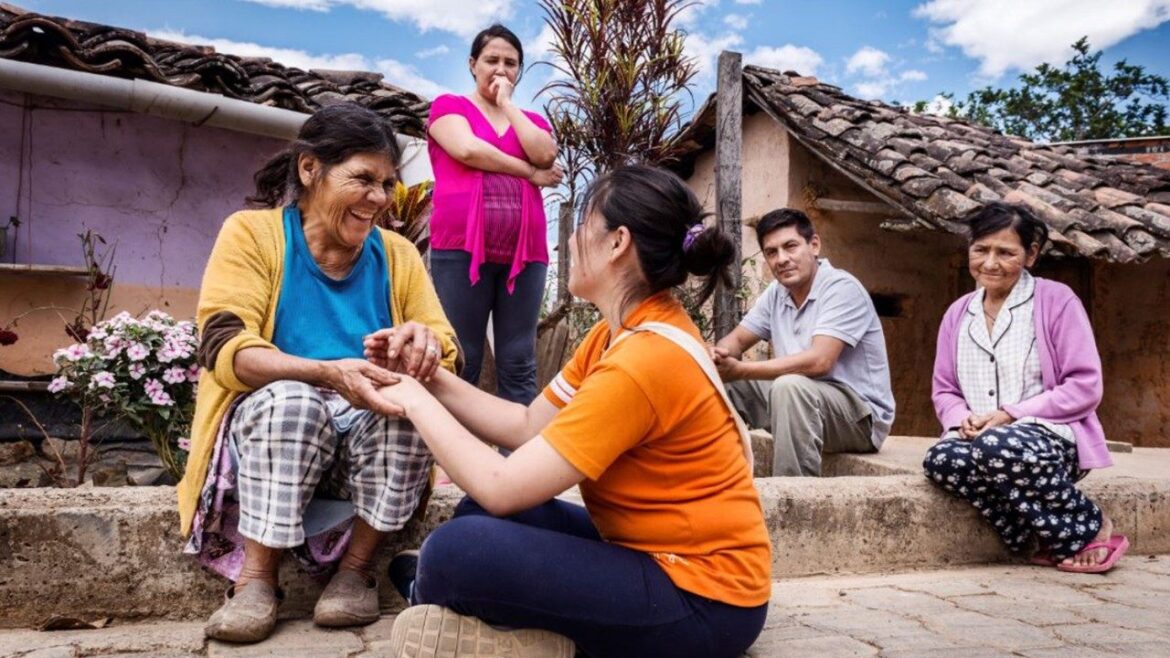Idente missionaries have been walking alongside students and families in Andean and Amazonian villages for over 21 years, an experience that began as a response to the wounds of local communities and that has become an opportunity for encounter, service and vocation.
By Eleanna Guglielmi
“It is not we who change the communities but they who change us.” This is how Mónica Calva, an Idente missionary and Director of the University Missions at the Universidad Técnica Particular de Loja, describes the Idente Mission in Ecuador.
It is a mission that “brings hope, but above all gives young people the opportunity to leave the classroom and experience life in indigenous villages, where the simple faith of the communities becomes a school and a proclamation,” as missionaries Karla Esparza from Zamora Chinchipe and Priscila Nole from Ibarra explain.
Early steps
Misión Idente Ecuador (MIE) was founded in 2004 when a group of missionaries from Spain, Brazil, Peru and Colombia, along with university students, returned from Chile after participating in the Misión País. That experience gave rise to a question: “What can we do here to help our people?”
This marked the beginning of a process. They realised that their action could not be limited to social aid or volunteer work, which sometimes serves only to ease the conscience. It had to go further: to bring the Good News of the Gospel to the most forgotten villages, combining evangelisation and service.
It was then, during the first mission in Pangui, in the province of Zamora Chinchipe, that a priest who welcomed these young people into his parish said something during his homily that left a lasting impression on everyone: “Pangui, tu vida es misión” (Pangui, your life is mission).
Those words became a source of inspiration and, over the years, have become the motto that still accompanies this experience today: “Ecuador, tu vida es misión” (Ecuador, your life is mission).
Wounds that need healing
Villages without water or healthcare; areas where only the elderly remain; families who live off what they grow, others marked by violence. This is what the Identes missionaries from Loja, Santo Domingo and Ibarra faced.
Their goal was not to fix everything, which was impossible; but to be there: to listen, to accompany, to share. They understood that the urgency is not to offer immediate solutions. It is through their presence that change can happen.
Care for young people
Involving university students was not a small detail but the heart of the mission. Students are not called to “volunteer,” but to give themselves completely: walking through the outskirts, using their skills to help the families who welcome them, and sharing the challenges of daily life.
Year after year, hundreds of young people choose to leave their classrooms and comfort zones behind to discover that a ‘university’ can become a place of proclamation and mission. And the experience does not end when they return home.
Many continue with other forms of service, they remain in contact with the families they visited, they ask for spiritual accompaniment, they transform what they have experienced into research or social innovation projects. Some even discover their own vocation.
“I owe my calling to the Misión Idente Ecuador,” confides a priest from Quito. And a contemplative nun writes to give thanks: it is there that she recognized her vocation.
Communities that evangelise young people
The mission is not a one-way street. Young people come to help, but it is they who receive. The communities, with their sincere faith, teach that it is possible to live with little without losing one’s joy.
It is a shock that leaves a deep impression: those who come from urban and secure backgrounds find themselves faced with poverty and, at the same time, a joy that converts.
Family spirit and ecclesial signs
The secret of the mission is not the programmes, but the atmosphere. The family spirit, cultivated in common prayer, shared meals and the simple hospitality of families, becomes the setting that makes everything else possible. “If we live well together, everything else follows,” Ruth of Ibarra emphasises. The mission is not a project to be carried out, but an experience to be lived as a community.
In 21 years, the Misión Idente Ecuador has seen the participation of over 4,300 students, reaching nearly 500 communities and accompanying approximately 30,000 families. Conditions cannot be changed overnight: “We cannot say that everything will be resolved, not even with medical care days,” say missionaries Mónica and Ruth.
This experience has given rise to lasting bonds with the communities; vocations to consecrated and priestly life; but also research, social innovation, and volunteer projects that continue well beyond the mission itself.
In each community, the mission is part of the pastoral plan of the parishes, collaborating with parish priests and training local leaders who then accompany Church activities.
It is in this intertwining that the mission finds meaning and continuity: this project has become part of the ecclesial life of Ecuador, which, through the dioceses, welcomes students and missionaries every year.
Roots and future
Today, the mission bears the faces of consecrated men and women from all over Ecuador: from Loja and Zamora Chinchipe, to Imbabura and Quito; from the coast to the Sierra, to the Amazonian East. Mónica, Karla, Priscila and Sara, together with fellow travellers such as Teodoro, Santiago, José María and Luis Daniel, join consecrated women from Spain, Peru and Nicaragua, including Rosario, Cristina, Patricia, Luján, Elieth and Fannery.
This diversity of origins shows a presence that is capable not only of reaching communities, but also of planting local roots and generating new vocations.
It is a mosaic that shows that a seed planted over 20 years ago has grown, intertwining stories and territories. It is no longer the mission of a few. It is a mission that belongs to an entire country.




